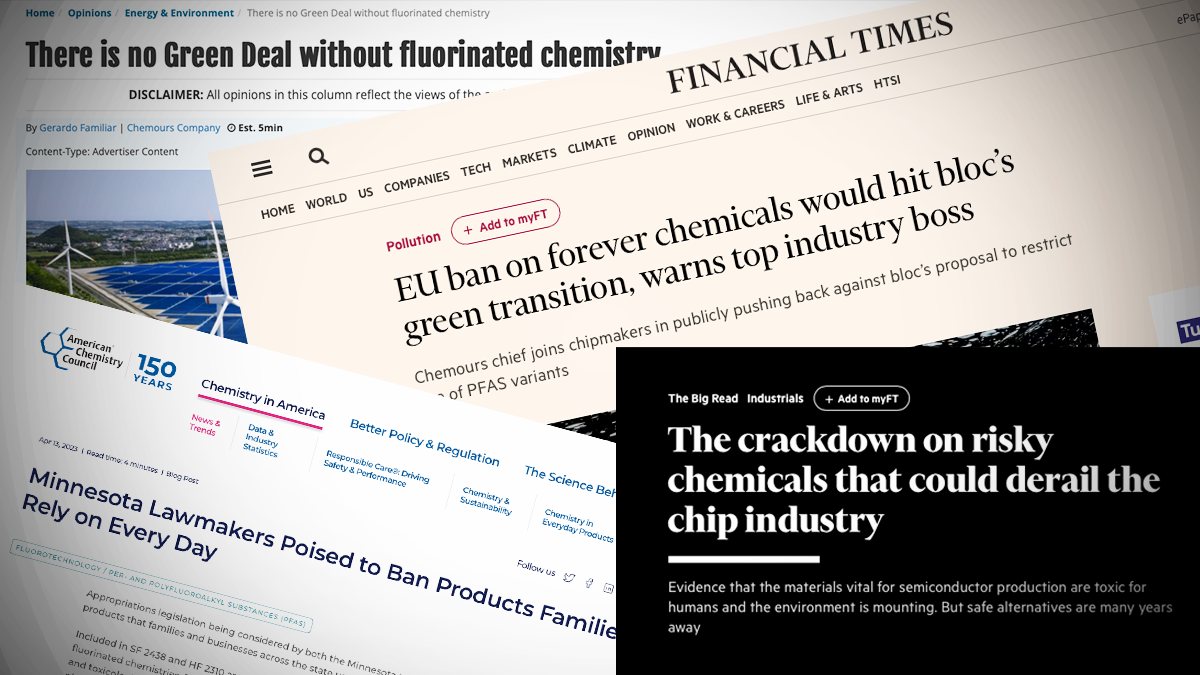Toxic PFAS chemicals, used in a multitude of consumer products during the last decades, are on everyone’s lips these days. In fact, if you are wearing lipstick, there’s a good chance that you, literally, have these cancer-causing chemicals on your lips.
Following the extensive industrial use of PFAS, research shows that 98 percent of humans have PFAS in their blood. Unfortunately, that means you, and your kids, too. In addition, a recent newsroom investigation revealed that at least 17,000 sites all over Europe are contaminated with PFAS – and that’s a conservative estimate.
As a result, EU policymakers are now drumming up a ban on PFAS so extensive that it is unprecedented in the history of chemicals legislation. Institutional investors, too, are starting to realize that PFAS are a systemic risk that must be tackled. Over 50 investors, collectively managing or advising assets exceeding $11 trillion, have launched the Investor Initiative on Hazardous Chemicals (IIHC). This initiative, coordinated by ChemSec, asks chemical producers to phase out PFAS, or forever chemicals as they are called, due to nature being unable to break them down.
No wonder chemical companies are backing down. For example, chemical giant 3M, one of the world’s PFAS OG’s, recently announced it will stop producing forever chemicals. The decision has undoubtedly been fueled by the fact that since 2020, at least three PFAS-linked lawsuits a day have been filed against 3M, which have made a massive dent in the company’s stock price.
“More and more PFAS producers are joining in and forming a kind of PFAS whack-a-mole. And yes, you guessed it. It’s hammer time.”
Everyone seems on board with the idea that we need to minimize the industry’s dependence on PFAS and put resources into innovation of alternatives.
Well, almost everyone.
Chemours, another chemical company at the forefront of PFAS production, has spent the last couple of years bemoaning that it was spun off mother company Dupont, and inherited not only the PFAS production but also all the liabilities, lawsuits and remediation costs that came with it.
Get updates like this first
Subscribe to our newsletter.
But the leadership must have decided it was time to get out of the victimhood and start showing energetic action somewhere along the way. But instead of the logical choice to put resources into R&D of safer alternatives, the company has taken the deeply confounding decision to chicken race against the world’s PFAS brain trust. It has now launched a charm offensive and is spending its whole communication budget to convey its unorthodox message that PFAS are, in fact, really swell.
Mark Newman, CEO of Chemours, recently told the Financial Times that: “It’s really amazing to me that we would think of walking away from a group of chemistries . . . that enables the green economy.”
More PFAS
To be fair, Chemours aren’t alone in making the “PFAS are critical to the green economy” argument. More and more PFAS producers are joining in and forming a kind of PFAS whack-a-mole, keeping researchers and NGOs on their toes. And yes, you guessed it. It’s hammer time.
Argument: PFAS is critical to enabling the green economy
Most PFAS are not going to critical applications. For example, looking at the fluoropolymer market in the EU, a sub-category to PFAS where you find a majority of critical uses, only about eight per cent of the total production volume goes towards the often-cited examples of renewable energy, semiconductors and pharmaceuticals. In addition, the EU’s proposal to ban PFAS has derogations for green technologies. Therefore, the argument that the PFAS ban will undermine the green transition – or some other essential project – can be discounted as gaslighting. Nobody is claiming this except the PFAS industry.
Argument: There are no alternatives to PFAS
While it’s true that there is no silver bullet that can replace PFAS in all applications, there’s a variety of alternatives for a wide range of uses. Even the case of replacing PFAS in semiconductors, dubbed mission impossible and often cited as a primary reason for keeping PFAS around, now has viable alternatives. Excellent engineering and innovation can conquer most problems in chemical space; you just need to embrace the challenge and get to work.
Argument: You need to crack some eggs to make an omelette
The argument here is, “Sure, PFAS causes cancer, but we need them to combat climate change”. So let’s say we decarbonize our economies but continue with the current mass production of PFAS; have we really won? We will all walk around with increasingly high levels of hazardous PFAS substances in our blood, with all the health issues connected to that, such as different cancers, infertility and impaired immune function. Ask the citizens of Veneto, Antwerp, Dordrecht, Ronneby or Korsør – all of which have for years been exposed to high levels of PFAS – what that’s like.
The truth is that the “PFAS is critical for the green economy” argument is highly overused. The allure of it probably lies in the fact that there is some truth to it. Yes, there are some applications where there currently are no alternatives. The sound of the horn, however, is tooting a whole lot more than what is called for. It’s reassuring then that the policymakers have understood that we need a comprehensive ban on PFAS, with few, very specific derogations in cases where there are no alternatives. This would be in the interest of everyone except a very loud minority.







